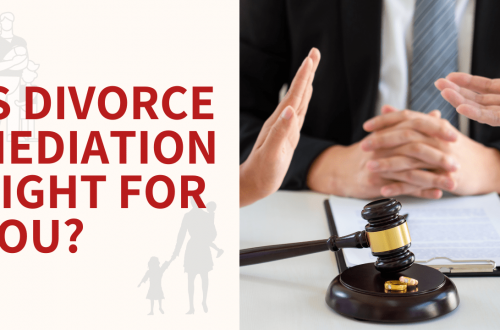Divorce Mediation – Is it an Option?

Divorce Mediation – Is it an Option?
Divorce mediation is among the most commonly used techniques of negotiation for a divorce settlement. In divorce mediation, both you and your partner or, if you and your partner agree, both you and your joint lawyers hire an objective third person, known as a mediator, to go to you or to meet you in an attempt to discuss and perhaps settle the various issues in your divorce case. Mediation can take place before or after your divorce case has been finalized through settlement negotiations. Often, the mediator works out an agreement beforehand which will be presented to the court.
Generally, divorce mediation is a collaborative process. It does not require any legal representation on the behalf of either party. A neutral third party such as a professional divorce lawyer or an experienced divorce attorney is generally invited to participate and assist at the beginning stages of divorce mediation. The mediator helps you understand what is included in the agreement that is being negotiated and how the agreement can affect your life once you are no longer married.
When you are considering whether divorce mediation would benefit you, one question that may be confusing is: How does a mediator help me? Quite simply, mediation allows you the opportunity to discuss your concerns with your spouse in a safe setting without revealing any of your secrets or making embarrassing statements about your financial information or other marital concerns. Both you and your spouse are able to remain calm during the discussion. You can also learn a lot from the opinions and experiences of a neutral third party.
If you decide to proceed with divorce mediation after the initial divorce mediation session, it is essential to keep very carefully track of exactly what was agreed upon by both you and your spouse during the meeting. Keep track of specific discussions about child custody, spousal support or alimony and other financial matters. Make sure that you both clearly understand each word that is being said during these sessions. Never give your spouse advice regarding something that you yourself know nothing about. It is also important to remember that whatever information is provided to a divorce mediator has the potential to become public record, so you should never share this information with anyone else, even if you are happy with the divorce outcome.
Once you have decided that divorce mediation will help you, it is important to be aware of what you should expect when you begin the process. During the divorce mediation, your primary concern is to try to get your spouse to agree to a compromise that is satisfactory to you. If your efforts to get a compromise are met with resistance, your tone of voice may get impatient and you may become more combative. You should be careful not to become too combative and express anger or frustration at your spouse. This could damage your case and lead to a lack of agreement on the terms of your settlement. It is perfectly acceptable to disagree with a spouse over certain issues, but you must avoid expressing your disagreement in a way that is destructive.
Another important thing to be aware of is that spousal support is not a part of most divorce mediation sessions. Spousal support is considered private property and is not subject to negotiation during mediation. Therefore, unless you want to end up paying alimony payments or trying to convince your spouse to accept some type of repayment plan for your former spouse, it is usually not wise to bring up this matter during the divorce mediation process.
It is also important to remember that during divorce mediation the judge may make a decision concerning the child support payments. Again, unless you are requesting a judge to order child support payment modifications based on what you and your former spouse agreed to pay previously, it is usually best to avoid discussing this during your divorce mediation. It is perfectly acceptable to disagree with your spouse as a matter of course, but discussing these matters with your attorney could potentially jeopardize your case. Remember, an attorney can only represent you if he or she believes it will be successful. Therefore, if your attorney believes you will receive less support than you would if you settled the matter through divorce mediation alone, it may be better to proceed with your divorce settlement yourself.
In short, divorce mediation can be helpful in resolving several common marital issues, including spousal support, child custody, child support, division of assets, and the division of debts. However, divorce mediation is not appropriate for all types of divorce cases, including those where one party is seeking sole physical custody of a child or children. It is also not recommended to use an attorney to represent oneself in a divorce case.



